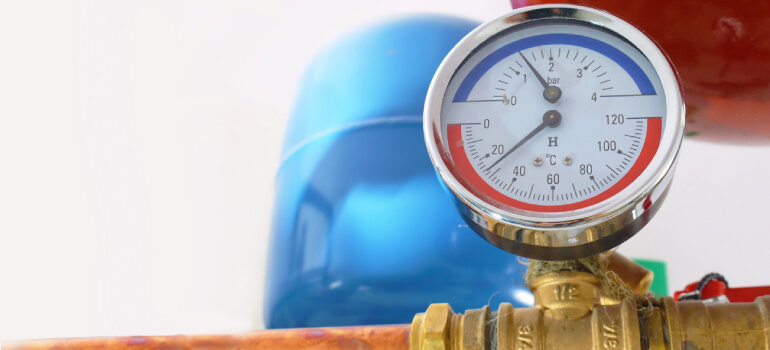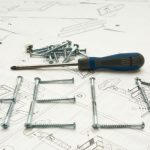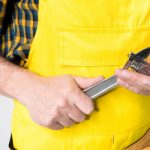
You’ve noticed that your shower water trickles? And does your washing machine take forever to fill up? Those are all signs of low water pressure and this common issue appears in many households. That being said, have you ever thought about what happens when your home water pressure is too high?
High water pressure shortens the life cycle of your appliances and damages your plumbing fixtures, leading to leaks and pipe bursts. Not only that, but excessive water waste is bad for the environment and may cost you more than you think.
You are in the right place, if:
- You hear banging noises coming out of your pipes;
- Your appliances leak every now and then;
- You seek advice from experienced professionals.
So, let’s find out why your domestic water pressure is too high and in the meantime learn how to test it. With a bit of luck, you may find out that the problem isn’t as intimidating as it seems.
Table of Contents
Symptoms of High Water Pressure in Your House
1. Banging Sounds in Pipes
We’ve all heard that scary banging noise coming out of the pipes. It’s called a “water hammer”, and it happens when speeding heavy water flow halts. A fixture, such as a faucet or a valve, may stop the water in its tracks.
The result is a shock wave sent through the water in your plumbing system. In fact, strong vibrations create the well-known shuddering sounds in your pipes.
2. Leaking Fixtures and Burst Hoses
Your domestic plumbing fixtures can’t withstand excessive water pressure. When a strong water flow pushes through the fittings, it leads to bursting pipes and hoses. This may even create a pinhole leak, which appears only when the damage to your walls or ceiling has been done.
According to statistics, water pressure above 80 psi (pounds per square inch) causes the failure of water fixtures.
The most common signs are spitting or leaking faucets, especially if it’s out of the cold tap. Another telltale sign is when a small stream of spraying water appears at the sides of the stream.
Contact reliable experts if your sink is leaking, or there are any noticeable faults throughout your plumbing network.
3. Failing Appliances
You’ve just bought a brand new washing machine, and it failed during the first month. Did your dishwasher flood the kitchen? Don’t rush to blame the manufacturer as premature appliance failure is a symptom of high water pressure.
The fault in a leaking water heater could be due to excessive water force, as the appliance’s internal parts can’t withstand high pressure. So, be cautious – check that the water pressure doesn’t exceed 80 PSI. Otherwise, you risk ending up calling the nearest technician for a dishwasher repair service.
And before you blame your plumbing company or your water supply network, first find out what causes the problem.
Need a Plumber Near You?
Enter your postcode to view our rates and availability in your area.
For questions about the services we offer visit our main site or you can always call us at 020 3404 4045
Causes of High Water Pressure
Most changes in water pressure are the suppliers’ responsibility. Note that you may experience excessive water pressure if high buildings or many hills surround your home. To reach those living on top floors, the supplier pumps even more water.
Useful tip: Based on the location of your property, the standard water pressure varies from 3 to 5,5 bars.
Fire hydrants use many litres of water in a matter of minutes, and to operate as intended, they require a stronger stream. If you live near one, this may be the cause of your house’s high water pressure.
When the water network has gone through maintenance work, trapped air is built within your pipes. This temporarily increases the pressure. Try to run your taps for a couple of minutes to see if that will fix the issue.
Abnormal pressure may result from the re-routing of the water supply network. In most cases, the companies are efficient and the normal water distribution returns promptly. On some occasions, the problem arises from your fixtures and installations.
Now that you know what causes the problems with your water pressure, it’s time to learn how to act.
How to Diagnose and Fix High Water Pressure in Your House
So if you are a DIY plumbing enthusiast, we’ve gathered the exact 3 steps to follow.
Step 1. Test With a Water Pressure Gauge
The water pressure gauge measures the applied force of the liquid when it’s at rest. The instrument is easy to use, and it’s composed of a dial indicator, braided hose and fitting.
A pressure gauge test is the most effective method to check your home’s water pressure. You can find the tool in most hardware stores or order it online.
You’d like to perform the test on your own? Follow this simple guide and learn how in just 5 minutes.
Useful tip: Remember that the residential water pressure shouldn’t exceed 80 psi. You should take action if your pressure gauge shows force higher than that.
Step 2. Use a Pressure Reduction Valve
The valve controls the flowing water via an internal diaphragm. Just set the regulator to your preferred setting.
The definitive answer to your high water pressure problem may be to fit a pressure reduction valve. It requires certain plumbing skills and knowledge to install the instrument. Book a plumbing installation service if you are a beginner.
Yet, you may feel that you have the expertise, and you seek a DIY challenge. You better know how to use a tubing cutter, because you’ve got some work ahead. Follow this guide on how to fit a water pressure reducing valve.
The regulator lasts for over 7 years, and it’s beneficial for your water bills. As claimed by the International plumbing code, it’s always wise to have one installed. On top of that, you may save a minimum of 60 litres of water per hour. Isn’t that great?
Useful tip: Do not turn down the mains stopcock, as it may cause reduced flow and a noisy plumbing system.
Step 3. Contact Your Water Company
Call your water company If you notice that your water pressure is immensely above the normal standards. When the force exceeds 100 psi or more, this could indicate a problem in the water supply network.
It’s the supplier’s responsibility to make sure that your home receives normal levels of water. Companies offer you the option to file a complaint if you aren’t satisfied with their actions.
Useful tip: Check this map If you aren’t sure which water company distributes to your region, and how to contact them.
Check also:
How to Find Reliable Plumbers Near You?
Takeaways
- Listen to your plumbing systems for any banging or shuddering sounds.
- Always call professionals to determine the cause of a leak.
- See if your appliance fails earlier than expected, as this may indicate high water pressure.
- Use a water pressure gauge to check your mains water force.
- For your benefit, get a pressure reduction valve (PRV) installed.
- If your domestic water pressure is too high, call your water distribution company.
Did we miss something? Tell us in the comments!
Image source: pryzmat / Deposit Photos




Hearing. Humming noise from pipes. All over. House and. Tingling under floor
Nice tips! Thank you for the info!
I have a customer where I installed unvented hot water cylinder. New 25mm incoming mains. Until last year the pressure has been ok. Now the customer is complaining that they have very low pressure and hardly any water comes from the shower. Complained to water board. They came and checked and said the water pressure is 1 bar and that is normal . Is that true?
Im going to be honest, there a few things in there that are brilliant and that I’ve never really thought about. This has genuinely helped with a few pressure isues, Thanks for writing this. Really informative and despite the subject matter was acutally really enjoyable to ready. Helped me a lot.
I recently had bad water leak resulting in high water
Bills .Plumber recommed i get my pressure checked…water maintence.guy
Checked pressure it was 130 psi.—much too high..
No Pressure Reducing valve was insalled [n water meter.
They immediately installed one and set my pressure to 70 psi.Can I hold them responsible for my damaged.? E mail me with your answer,Thanks Charles Moore.
This was all very useful to an old 77 he old lady but I had just had myboiler maintained he turned up the pressure my dish washer flooded and now the on off switch won’t work is the the fault of the water pressure please advise if possible
Thank you Beatrice.
Hi, Thanks for publishing this, it has actually helped with a few pressure issues. It was quite instructive, and despite the subject matter,
Really useful article, informative without being alarmist. Think this subject is being downplayed in the current house-building frenzy. Plumbers happy.